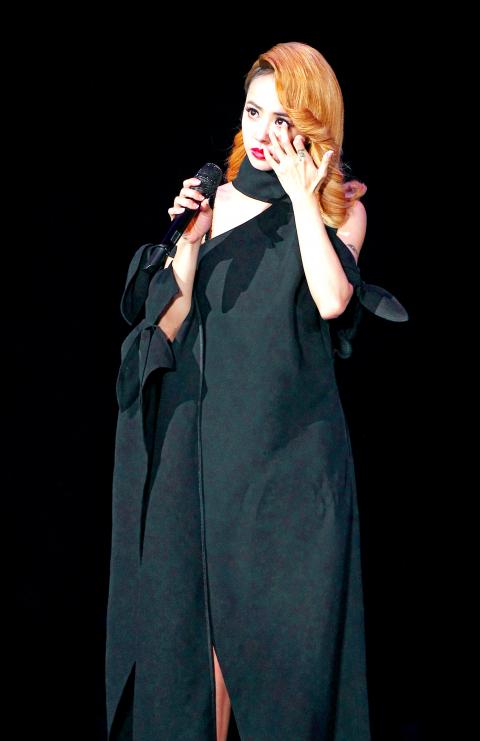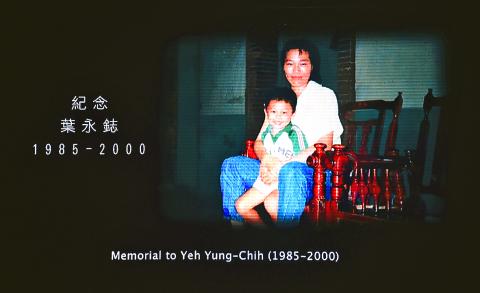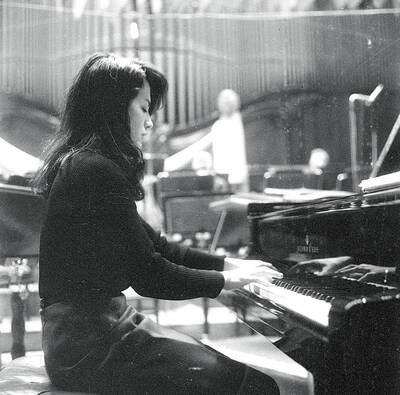Early this month, Jolin Tsai added four concert days to her concerts at Taipei Arena. To voice her support for gender equality, she shared moving stories at all her PLAY concerts. A new documentary was made for these additional performances, and for several days the documentary, Rose Boy — Yeh Yung-chih, brought the audience to tears. After the entire film was published online on Monday last week, it sparked heated discussions among netizens. In particular, the part in which Yeh’s mother spoke at the Taiwan LGBT Pride Parade made many shed tears and call out, “Thank you, Mrs. Yeh, for letting us see the light.”
“Rose boy” Yeh Yung-chih’s story took place 15 years ago. Because of his femininity, his classmates would often pull down his pants, which made him fearful of going to the toilet during breaks. In his third year in junior high school, he left the classroom five minutes before a music class ended and went to the restroom, and was later discovered lying on the floor in a pool of blood. He later died in the hospital despite doctors’ effort to save him.
The production team paid a special visit to Yeh’s mother in Pingtung in southern Taiwan. She recalled that when Yeh was in his third year in primary school, his teachers told her that he liked to do girly things and asked her to take him to see a psychiatrist. However, the psychiatrist assured Mrs. Yeh that her son was perfectly normal and told her, “Those who regard your son as abnormal are themselves abnormal.”

Photo: Wang Wen-ling, Taipei Times
照片:自由時報王文麟
Thinking back, Mrs. Yeh still became very emotional. She said, “I have lost my son, but I will save people like him. If by coming forward I can save them, I will do that.” Over the years, she has traveled to many places to voice support for people who have suffered from gender inequality. At the Taiwan LGBT Pride Parade she said, “Children, be brave. You were created the way you are, so there must be a ray of light that guides you to fight for your human rights. Dry your tears.”
At the end of the film, she once again encourages people who suffer from gender discrimination by saying, “Children, don’t cry, for crying makes us seem weak. We have to face the sunlight and fight for our rights.” Her resolute look is touching.
After the film ended at her concert, Jolin, with tears in her eyes, also said, “Since childhood, we have been taught what is normal, but seldom were we taught to be tolerant. To be able to accept others, we have to begin with accepting ourselves and accepting all kinds of possibilities.”

Photo: Pan Shao-tang, Taipei Times
照片:自由時報潘少棠
She said, “I hope that Yeh’s story will encourage you all to be more tolerant. First you have to accept yourself. Perhaps you are truly different, but so what? Performers need the public’s acceptance more than the average person, so sometimes I also lose my way. If you have friends around you who need your help, please open your mind and give them a hand.”
(Liberty Times, translated by Ethan Zhan)
「Jolin」蔡依林十一月初在小巨蛋加場連唱四天,為了聲援性別平權,她都會在「PLAY」演唱會分享感人的故事。這次加場她也拍了新的紀錄片,「玫瑰少年」葉永鋕的影片連續幾天逼哭現場觀眾。上週一完整影片在網路上公開後,更引起網友熱烈討論,尤其是葉媽媽在同志遊行發聲的片段,更讓大家哭成一遍,直呼:「謝謝葉媽媽讓我們看到曙光!」
「玫瑰少年」葉永鋕的故事發生在十五年前,葉永鋕因個性較女性化,常被同學強行脫褲,導致他不敢在下課時間去上廁所。國中三年級時他在一堂音樂課下課前五分鐘提早離開去廁所,後來卻被發現倒在血泊中,送醫不治身亡。
製片團隊特地南下屏東訪問葉媽媽。葉媽媽回憶葉永鋕國小三年級時,學校老師就曾反應他喜歡做女生做的事,要她帶兒子去看心理醫生。但是醫生保證孩子非常正常,還說:「覺得葉永鋕這樣不正常的人,本身就不正常。」
回想起往事,葉媽媽依舊很激動。她說:「我的小孩沒有了,但我要救像他們這樣的人。如果我站出來能夠救這些人,我願意。」這幾年她四處奔波為遭受不平等性別待遇的人發聲,她在同志遊行上高呼:「孩子們,你們要勇敢,天地創造你們這樣的人,一定有一道曙光,讓你們去爭取人權,不要哭。」
影片尾聲,她再次鼓勵受到性別歧視的人們:「孩子們,你們不要哭,哭會顯得我們懦弱。我們要向著陽光,去爭取我們的權利。」堅毅的神情讓人感動。
蔡依林在演唱會上播完影片後,也哽咽地說:「我們從小就被教育著什麼叫正常,卻很少被教育要有包容心。要接納,要先從接納自己開始,接受所有可能性。」
她說:「我希望永鋕的故事,鼓勵你們大家,多一份包容心。先認同你自己,也許你真的不一樣,但是那又怎樣。尤其身為演藝人員更需要大家的認同,我有時候也會迷失方向。如果你身邊也有朋友需要幫助,請你打開你的心,伸出你的雙手。」
(自由時報記者張釔泠)

Rehearsal time is over. The world’s best and most ambitious young pianists have descended on Warsaw for the Frederic Chopin International Piano Competition — for some, a gateway to classical music glory. Fans from around the globe snapped up tickets as much as a year ago. The lucky ones attended the opening night concert on Oct. 3 and will follow along as the contest builds to a thrilling climax on Oct. 20. Winning the Chopin International — held every five years in the 19th-century composer’s homeland — can raise the curtain to playing at venues across the globe and signing contracts

A: K-pop supergroup Blackpink is finally touring Taiwan again. B: I can’t believe we’re going to Blackpink’s concert at the Kaohsiung National Stadium over this weekend. A: The group has caused a global sensation since it went international in 2020. B: And the four members — Jisoo, Jennie, Rose and Lisa — have achieved success as solo artists. A: Seeing them live will be like a dream come true. A: 韓流天團Blackpink終於又來台巡演啦。 B: 真不敢相信我們這週末要去她們在高雄國家體育場的演唱會。 A: 該團自2020年進軍國際,便持續造成全球轟動。 B: 而4位團員––Jisoo、Jennie、Rose、Lisa––單飛也很成功。 A: 這次能去她們的演唱會真是美夢成真! (By Eddy Chang, Taipei Times/台北時報張迪)

Many popular English expressions originate from the world of sports. While their roots lie in athletics, their meanings extend far beyond the playing field. Here are three examples. Hat Trick This expression comes from cricket. When a bowler dismisses a batter, it’s called “taking a wicket.” Taking three wickets in a row is a great achievement, so in the past, a bowler who achieved this was rewarded with a hat. Later, sports like hockey and soccer adopted it to mean scoring three goals in a game. Nowadays, this phrase means to achieve any three successes consecutively, not just in sports. For example,

A: Is K-pop still popular now? B: Sure! The 110,000 tickets for supergroup Blackpink’s two shows to be held this weekend were all snatched up within three minutes. A: Apart from Blackpink, what other K-pop stars are visiting? B: I-dle’s Taiwanese member Yeh Shu-hua, King of K-pop G-Dragon, and Super Junior are all coming soon next month. A: Super Junior’s 2009 hit “Sorry, Sorry” boosted this Korean “Hallyu” to a peak. Let’s go experience SJ’s magic again. A: 韓國流行音樂還是很受歡迎嗎? B: 當然啦,光是天團Blackpink本週末兩場演唱會,11萬張門票3分鐘內就被秒殺! A: 除了Blackpink,還有哪些韓國歌手最近會來台? B: I-dle的台灣成員葉舒華、韓流天王G-Dragon權志龍、Super Junior下月也都將來台。 A: Super Junior 2009年金曲《Sorry, Sorry》曾將「韓流」推上高峰,我們再去重溫一下SJ的魔力吧。